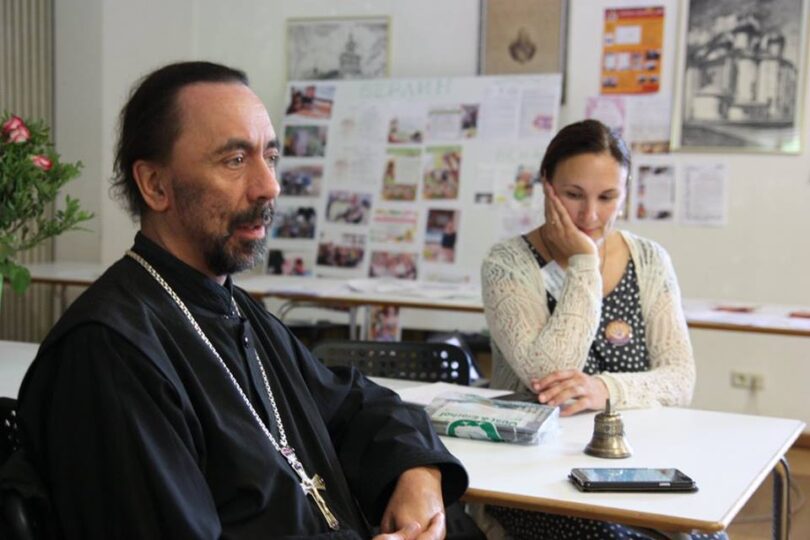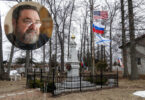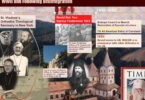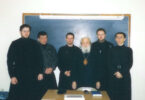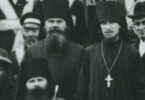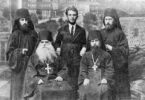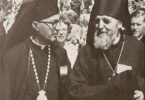In ROCOR we have young people from a whole variety of different backgrounds – offspring of the third and fourth generation of immigrants. Some young people had left Russia in childhood and grown up abroad; some came to the West already in adolescence and still mostly identify themselves with the old country. There are also young people who don’t feel any connection with Russia whatsoever because they are second generation Americans. Is this the same in Germany, or is your situation different?
It is a bit different in Germany; here we practically have no young people from the “old immigration.” The young people we work with are those immigrants and their descendants who came to Germany in the period beginning in the 1990s, so these days they are mostly kids who have been born in Germany. Now and again you come across adolescents who arrived in Germany when a bit older, but mostly these are young people for whom Germany is their homeland ‑ although they also have a wider cultural reference. However, for all of them, the German language is much more their native tongue than Russian could ever be.
Fr Ilya, what is the name of the diocesan department that you are in charge of?
It’s called the Diocesan Department for Youth Work and it’s been going on for about 10 years.
It’s got a head ‑ that’s me, and a youth leader, Katja Khorsun. Also, Archbishop Mark insists that in accordance with decrees of the ROCOR Bishops’ Council, each diocesan council should have a youth representative to report on the department’s work and future plans.
So you see, the department is more or less active in a number of directions. For our part, we have three Pan-German youth conferences a year. Lately, the boundaries of these conferences have extended beyond Germany, so that we have delegates coming from abroad ‑ not just from Ukraine, Russia, and Belarus but further afield too, from the Baltic States and the Western countries like France. For the past thirty years, the December conference has always taken place in Munich, the June one, in Cologne and we also hold a small meeting in May to coincide with the Victory Day. The young people go in procession from St Job’s Monastery in Munich to the concentration camp in Dachau to commemorate its liberation. The two days that we spend together are used to study the writings of St Nicholas of Žiča who was incarcerated there.
Other than that we try to maintain contact with all our parishes and their youth organizations. In practical terms, this is often difficult to effect because in the first place we have limited financial resources and secondly, many of the people involved in youth work have also other responsibilities. For example, Katja Khorsun and the other guys in Munich and Stuttgart and I are heavily involved in the organizational side of things which we have to fit it in the time left over from our normal work. This means that we really ought to work much harder to get those parishes with no youth participation to wake up from their ‘liturgical sleep’ [laughs] and play a more active role. Unfortunately, we are not strong enough to do this, but can, at least support existing youth organizations, maintain contact, speak on the phone, create Facebook groups and so on to enable the young people to keep in touch and know what’s going on.,
And I have to say that in the past few years we have seen some tangible results from all this activity. Young people today are much more willing to travel to events organized by other youth organizations than they were 5-7 years ago. For example, ballroom dancing is very popular, not perhaps with the larger parishes like Berlin, Cologne, Stuttgart, Munich, but everywhere where these balls take place they attract a lot of visitors from different parishes. People know about them, they are looking forward to going, get themselves ready, etc. And the conferences too, especially the ones in Cologne and Munich play a very positive role in fostering friendships, establishing contact between people from different places which then continue even these events are over.
I have another question, is there any cooperation between ROCOR youth groups in different countries or any kind of pan-ROCOR youth programs?
It leaves something to be desired because the situation in the whole of ROCOR is basically the same: we have no money and no organizational resources whatsoever. For example, Fr. Andrei Sommer who is running the program from New York at the synodal level is given no financial support for this and has to find money himself. All the same, come what may, we still have our three Pan-ROCOR youth conferences a year.
What about the Russian Orthodox Church of the Moscow Patriarchate? Does anyone from the MP German diocese take part in any of the youth initiatives in Germany or Russia?
Of course, they do. We make no distinction between the two dioceses at all ‑ at least not in Germany.
On the side of the German MP Diocese, we deal with Fr Aleksey Veselov from Bad Kreuznach with whom we have always had a close relationship and have been developing youth work in tandem from the beginning. He is a young, dynamic man who ‑ so far as I know ‑ graduated from high school already here in Germany. So he has an excellent understanding of the realities of our life here. Every year, Fr Aleksey and I hold a joint training seminar for camp leaders. And of course, we have our conferences which everyone comes to and where no distinction is made between the jurisdictions whatsoever. We have a youth work coordinating center headed by Bishop Seraphim of Liubertsy which is part of the ROCOR department for youth work; representatives from both ROCOR and the Moscow Patriarchate contribute to this single German coordinating center. As ever, there is a problem with staffing. There used to be a man in the Moscow Patriarchate diocese who had a lot of initiative and was always trying the develop the center, get us to work together, to talk, plan ahead, exchange information etc. But he left to go to the seminary in Sergiev Posad about a year ago, and this work has tailed off somewhat. I see this happening everywhere; it’s a big problem and I’m not sure what can be done about it.
So, you could say that some people really are indispensable?
That’s right, and whenever they disappear, the whole enterprise slows down or stops altogether.
Father, the Scout movement used to be one of those ‘traditional ROCOR’ youth activities as this sort of work was impossible in the USSR. What place does it have within the German diocese? What role, if any, does it play in the broader youth movement of the ROCOR German Diocese?
Strange as it may sound, none at all. We had tried to establish some links but nothing came of it. There are Orthodox scouts both in Munich and Frankfurt, and they organize their own summer camps; they aren’t particularly involved in any ROCOR youth movement as such.
I see. Parish schools have traditionally played an important role in safeguarding our heritage for later generations. Is there any significant cooperation with them?
It varies. Obviously, this is work more on the parish level. In other words, we in the diocesan youth department do not supervise parish schools, but use them to try to find partners, if you will ‑ youth representatives in the parish itself. As to the schools themselves, they are outside our brief because they are run on the parish level, and each parish administers their school independently In principle, of course, we would like to establish territorial youth organizations. Germany is a federation of sixteen states, rather like the United States of America. Each state is autonomous and independent as far as pre-school, school and university education is concerned. There is a case to made for the creation of regional organizations which could unite youth groups from different parishes within a specific federal state. This could then be supported by relevant social structures. I am convinced that we need to work together with society, to make use of the institutions, mechanisms, and tools which are available to aid social work. We need to learn how to make use of these tools. This is the vision of the projected union of youth organizations in the Federal State of Baden-Württemberg. Unfortunately, it’s only at a project state; my son Andrei who did a lot of work for it has recently moved from Stuttgart to Munich to go to university and it’s all gone quiet again.
Is there any point in organizing conferences for heads of Russian schools and Russian teachers? Maybe, if the diocese could assume responsibility for these schools as a single entity, this could help parishes. They can look into their needs, how they acquire teaching the material and whether there is any possibility of applying for grants from Russia.
This was basically the thinking behind the idea of creating a federal youth organization. We hoped precisely for this: for different youth groups ‑ parish schools too, of course, to which these youth groups frequently belong to ‑ to work together, exchange information and experience and organize conferences for heads of parish schools, teachers, and youth leaders. These conferences would raise awareness and standards and help improve general organization which is very important as, thank God, we have new youth camps springing up everywhere. However, as ever, it’s a question of using people and resources. We see people work all the hours God sends; the heads of parish schools and ordinary teachers find themselves working all week in their jobs and then spending Saturdays and Sundays in the parish school. Any time left over, they spend on their own children and household tasks. When you have such an intense work schedule, there is no energy left for any growth or development. These ladies could possibly come to a conference, but we can’t tell them, “We’re meeting in such and such place, get yourselves there and pay 50 euros for the privilege out of your own pocket” ‑ it just won’t do.
Father, you have already mentioned something about making use of the tools society has to offer. What do you mean?
I expect America is full of private charities and charitable funds to help with this work, but Germany is different. Because Germany is a European country with a well-developed social program, support for this kind of work is split between state and charitable sectors. In principle, all youth work in this country, whichever organization it is sponsored by, can depend on state or quasi-state support on city, region and even federal level. I’ll give you an example. Here in Stuttgart, we have an organization called the State Youth Circle (Stadtjugendring) which is a charitable institution fully funded from the local government budget. This is an umbrella organization comprising 50 or 60 different youth groups in the city ‑ from the enormous ones, like the Catholic youth association to the tiny, like the Russian or the Eritrean youth, the scouts, dance enthusiasts or pet rabbit keepers. This Youth Circle helps with organizational matters too. Say, we decide to hold a seminar on the theme of psychology of youth groups and apply to the Youth Circle for help. They could provide us with a venue, offer advice, give financial assistance or some ideas where to seek it. That’s because the Youth Circle is responsible for distributing the state’s youth work budget among its members.
Are there any Muslim organizations among them?
Of course. From the society’s point of work, Muslim youth groups are precisely the ones that shouldn’t be isolated. On the contrary, we must get them involved as much as possible. We had dealings with one Muslim youth organization; we invited a family to join us and they reciprocated. Quite decent kids, actually.
Where do you stand on catechizing adults in Germany? Do you have any regular instruction for adults?
Naturally, this is dealt with strictly on the parish level. In other words, there is no diocesan-level involvement except that Vladyka might talk on the subject at diocesan conferences. Just recently (September 2017) the Orthodox Education Centre attached to the Pokrov Church in Dusseldorf (ROC-MP) conducted a seminar entitled “Pre- And Post-Baptism Catechism In Russian Orthodox Parishes In Germany”. Among those taking part was Archpriest Alexander Usatov, a professor of the Don Theological Seminary (Rostov-on-Don) and an expert on the subject of catechism. We sent a few of our own teachers over there, even though it’s not exactly next door. It’s over 400 km from Stuttgart; to Americans and Russians this might not seem much, but it does to Germans! (laughs)
Still, catechism is very much parish business and we engage with it on many different levels. In our parish, we have two instruction groups: one is made up of older teenagers, the other is for young adults, so a few years older. I have just this group coming over tonight at 7 pm. We choose our topics for discussion ourselves and try to address them together.
Okay, Father. I have another question, this time about German-speaking young people who have converted to Orthodoxy. I have no idea of the numbers of Orthodox converts in Germany within ROCOR.
The numbers are tiny compared with America. But what we do have in Germany is a number of different ethnic groups who share German as their common language. In Stuttgart the person who hold it all together is Fr. Michael Buk, a German priest of the Paris Archdiocese. He serves in a small town in the Black Forest area, about 100-120 km south of Stuttgart. There he does a lot of youth work and organizes youth conferences. In particular, we have had a pan-Orthodox youth conference in Stuttgart for the last two years. Our Romanian brothers have suitable premises with wonderful gardens, and they hosted about 50-60 young people ‑ a unified group of Greeks, Serbs, Russians, Romanians and Syrians. The day would begin with the Liturgy in German and followed by talks, seminars … and roast lamb of course (laughs) This is the kind of cooperation we are striving for. There are specific concentric circles of encounter beyond the liturgical cycle, and all of us ‑ the clergy and the laity ‑ need to learn how to operate within them.
The first circle of encounter is the parish school:
- instruction in religious knowledge, Russian language, Russian culture etc.
- The next level is engaging with the parish youth beyond the school, by taking them to conferences, camps and pilgrimages;
- Then there follows contacts between Orthodox young people belonging to different Local Churches. Each sizable town usually has a number of Orthodox churches. We for example, apart from our two Russian parishes, also have two Greek ones, one Serbian, one Romanian, one Bulgarian and one Syrian. In the suburbs, a bit further afield, there is a Georgian parish within another church. So you see, we must reach out beyond our local church and engage with the others. I personally have always found such contacts very edifying, especially with the Greek and Serbian Churches. It was also wonderful to discover the Antiochian Church, which is limited both financially and in other means, but is, nevertheless, possessed of a very sincere and pious church culture.
- The next concentric circle is our encounter with non-Orthodox Christian youth organisations. The Protestants in particular have very good resources to aid youth ministry and ways to engage with young people.
- Finally we have general, non-religious organisations which coordinate all youth work activities in terms of administration and financial management. I consider it very important to learn to cooperate with these organisations and partners. We must reach out beyond our narrow circle without any fear of the society at large. What have we to be afraid of? You sometimes get the impression that we believe we will lose our Orthodoxy the moment we take a step towards these organisations.
That’s very true.
Lord have mercy on us, if we can lose it so easily
Well said. Fr Ilya, thank you very much for this new informative interview

